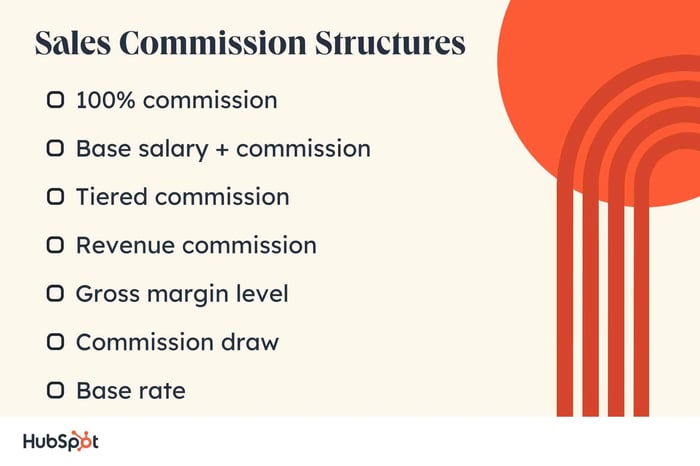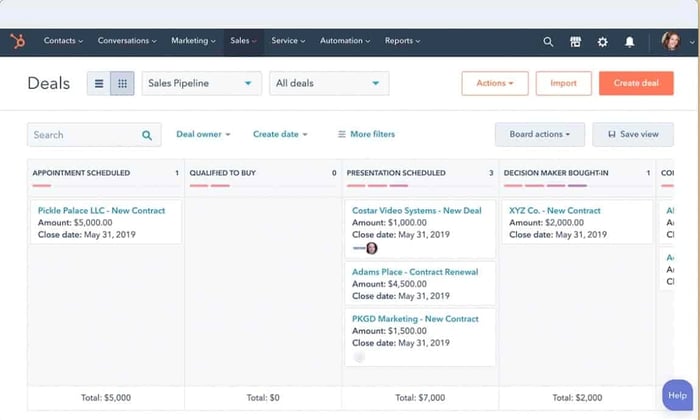Sales management is a key with the potential to unlock huge returns that impact a company's revenue and growth.
Think about it this way: Sales managers oversee the team that communicates directly with your prospects and customers on a daily basis. So, if a msales manager helps 10 reps sell 20% more, they've essentially just "created” two new salespeople.
This guide will cover the sales management process, along with strategies, best practices, responsibilities, and resources to help your team become high-impact players for your business.
Download Now: Free Sales Training Plan Template
Chapters
- What is sales management?
- Sales Management Strategies
- Sales Management Best Practices
- Sales Management Responsibilities
- Tools and Resources for Sales Managers
What is sales management?
Sales management is the act of overseeing and leading sales representatives to create strong relationships with prospects and close more deals. Sales managers do this by implementing sales management processes, strategies, and objectives to help their team hit or exceed their targets and goals.
Sales Management Process
Sales management isn't a linear process — everyone's strategies and responsibilities look slightly different depending on their team, products, and resources. We'll talk more about these throughout this piece.
Generally, sales managers oversee at least four main components: people, strategy, activity, and reporting. These are the four "steps" of the sales management process we'll cover below.
Sales Hiring and People Management
The first part of the sales management process is hiring a solid sales team. This involves writing strong job descriptions, interviewing eligible candidates, and working with HR to create fair sales compensation plans.
This stage also applies to people management, which involves sales training and coaching, as well as team-building and morale-boosting activities.
.png)
Free Sales Training Template
Use this template to set up a 30/60/90 day sales training and onboarding plan.
- 30/60/90 Day Goals
- People to Meet
- Feedback/Review Process
- And More!
Download Free
All fields are required.
.png)
Sales Strategy Development and Management
Sales managers are responsible for setting the vision and strategy for their sales team. A critical part of this is building the sales process that their team will follow.
This process keeps the team aligned and working toward the same goals, ultimately creating an autonomous, well-oiled machine.
Developing a sales process will also allow management to identify inefficiencies and notice where their team can improve.
Sales Activity Management
Next, sales managers are responsible for overseeing the day-to-day activity of their sales team — from prospecting to closing. This involves celebrating wins, understanding losses, and advocating for the team as a whole.
Sales management is just as much about the people as it is about the sales. This means that managers should closely monitor daily sales activity and address issues and wins when necessary.
Sales Reporting Management
The last step in the sales management process is analyzing and reporting on sales activity. Like with a sales process, sales managers should also create a systematized reporting process so their sales team knows where, when, and on what they're being measured.
This process could include reporting on the win rate, average sales cycle, and lead-to-opportunity conversion rate. Data can then guide teams on how they can improve.
Sales managers are also responsible for using this data to forecast future sales revenue and update team goals.
Here are some tips for effective sales management through the entire process.
Sales Management Strategies
- Establish compensation expectations.
- Set goals and quotas.
- Onboard and train new hires.
- Motivate reps.
- Act as liaison between reps and leadership.
- Create sales and revenue reports.
- Evaluate and adapt the sales process.
Here are seven sales management strategies to help your reps grow, feel motivated, and — most importantly — close more deals.
1. Establish compensation expectations.
Create compensation plans that include details about base salary and commission. This sets accurate expectations for your reps. You may or may not find yourself working with higher-ups and/or HR on this.
Setting these expectations for all team members is critical to maintaining strong relationships with both existing and new customers.
Why would this be?
If reps start work at your company and learn they don't make a commission on house accounts, there's a significant chance they'll focus their time and energy on new customers instead, since this is how they'd make a greater profit. This could cause you to lose existing, valuable customers, as well as upselling and cross-selling opportunities.
Consider factors like these along with your business's resources and plans for company-wide growth while developing your reps' compensation plans. Here’s a handy guide to learn more about sales compensation.
Below are the different ways sales commissions are usually set up.

2. Set goals and quotas.
Establish goals and quotas for your entire team, as well as for individual reps, so you can ensure everyone is working together and pulling their weight.
You can set a variety of sales goals for a number of different things including activities, job functions, training, and anything else you see fit.
Be sure to clearly communicate these goals and quotas across the team (and to your higher-ups and other departments if necessary). This way, everyone knows what's expected of them and understands what they're working towards.
You can do this during team or one-on-one meetings or add the information to the reps' sales enablement kits.
3. Onboard and train new hires.
Depending on resources, you may or may not be the sole person responsible for onboarding and training new hires. However, being a part of these processes is crucial no matter how your business goes about them.
By participating in onboarding and training, you can ensure that all reps start on an even playing field in terms of the information they have about your current processes and systems.
You must also provide reps with the information they need regarding your customers and products to begin closing deals. This includes training on the technology your team uses to chat with customers and work on deals — like a Sales Hub that helps reps move prospects from an early-stage lead to a delighted customer.
With this knowledge, reps will be prepared for the types of conversations they'll have with customers.
4. Motivate reps.
As a sales manager, you're a motivator for your reps. Whether they have a rough call with a customer, are unable to reach their quota, or are going through something personal, you need to be there for your reps.
It’s also essential to recognize and reward good performance to let your team know you’re invested in their success. Ask your reps what motivates them so you can tailor certain interactions to their preferences.
You can also host one-on-one and team meetings, weekly lunches, and team-building events to ensure everyone feels supported and motivated.
.png)
Free Sales Training Template
Use this template to set up a 30/60/90 day sales training and onboarding plan.
- 30/60/90 Day Goals
- People to Meet
- Feedback/Review Process
- And More!
Download Free
All fields are required.
.png)
5. Act as liaison between reps and leadership.
The position of sales manager lies between reps and higher-ups (such as directors, executives, or even senior managers, if your company has them). Your role requires you to act as a liaison between these two groups and advocate for your reps when necessary.
This might involve discussing raises or promotions for your reps with higher-ups and HR or simply sharing details about their successes across the organization.
Here are some more examples of the information you may relay between the reps and higher-ups.
Information From Reps to Leadership
- Details on how to improve the product line based on information from customers
- Any overall marketing, support, or brand feedback from customers
- Positive testimonials from delighted customers that are worth sharing with the organization
Information From Leadership to Reps
- Company-wide long and short term goals regarding growth
- New products and services being developed
- Any information that directors and executives decide they want to share with employees
6. Create sales and revenue reports.
As a sales manager, it's your job to compile and analyze data to assess the success of your reps both individually and as a whole.
These reports are not only for your eyes, but should also be reviewed with your reps. This transparency helps reps know how they're doing and whether or not they're on track to meet (or, hopefully, exceed) expectations.
These reports are also crucial for your higher-ups. The rest of the organization can learn how well you're doing and can provide feedback on what they need from your team to continue growing the business.
When creating your sales and revenue reports, you'll be able to determine the following (and more):
- How much revenue is coming through as a result of the work of your reps.
- How productive your reps are in terms of closing deals and communicating with prospects.
- Which products/services are sold most frequently and successfully.
- How often leads are transferred to your reps (and how often they're then contacted by those reps).
- Which of your assets are used most frequently as the first conversion point for contacts who end up becoming customers.
7. Evaluate and adapt the sales process.
A sales process is the method by which your reps move prospects toward closing. Strong sales teams almost always have a sales process, or framework, in place for reps to follow.
This ensures consistency for all prospects, no matter which rep they're working with. Professional encounters among reps and prospects can then represent your brand more accurately.

However, it's important to remember the sales process will likely need to be updated as your company grows and changes.
Whether it's because you have new products, a larger team of reps, or different buyer personas, you'll have to make sure your sales process is up-to-date and relevant. This way, it remains a powerful tool for reps to refer to throughout their time on your team.
Now that we've reviewed common sales manager strategies, let's go through some sales management best practices.
Sales Management Best Practices
- Invest in training and development for your sales reps.
- Create an engaging, motivating culture.
- Leverage each sales rep's individual strengths.
- Use positive reinforcement to create an uplifting environment.
- Attract and retain the right people.
- Consistently analyze the competitive landscape to ensure your sales reps have the best tools to succeed.
Great leaders inspire great teams. So here are some effective sales management best practices to help you nurture great sales teams from the start.
1. Invest in training and development for your sales reps.
Selling behaviors and strategies change over time, so it's vital you keep your team sharp and up-to-date on current sales best practices by investing in training and development opportunities.
Your job as a sales manager is to continuously ensure your reps have everything they need to succeed — plus everything needed to level up and become more effective in sales.
By investing in sales training, you're helping your reps remain engaged, motivated, and confident that they're selling to the best of their abilities. Further, 94% of employees say that they would stay at a company longer if it simply invested in helping them learn.
This means training and development aren’t just nice to have. Instead, it's crucial for the long-term success and retention of your employees.
Not sure where to start? Take a look at our list of the 36 best sales training programs.
2. Create an engaging, motivating culture.
You want to show your reps that their hard work is appreciated. An excellent way to accomplish this is to foster a culture where wins are consistently and publicly rewarded.
Additionally, sales can be a difficult field with high stakes, so you want your sales reps to trust each other and feel supported when they need help. It isn't easy to cultivate an inclusive, positive team culture, but it's vital to the success of your organization.
To create a strong sales culture, consider the following.
.png)
Free Sales Training Template
Use this template to set up a 30/60/90 day sales training and onboarding plan.
- 30/60/90 Day Goals
- People to Meet
- Feedback/Review Process
- And More!
Download Free
All fields are required.
.png)
Encourage friendly competition.
Have contests and incentives but make sure you switch up the type of contest to avoid the same winners repeatedly.
For instance, perhaps one month you host a contest for the rep who can book the most meetings. The next month you can host a contest for the rep with the fastest average sales cycle.
Ask your reps to compete against their own records.
This mitigates the resentment they might feel when they're asked to compete against peer numbers.
Hold daily standup meetings.
Ask each rep to share successes but also failures. Transparency is crucial for holding each rep accountable while also creating a sense of trust.
By encouraging a “fail fast” mentality, you're showing reps it's okay to fail…as long as you can pick yourself right back up again.
Share a common vision.
Create a sense of purpose beyond making money to motivate reps and align them under one mission statement. This also helps you avoid micromanaging. Once reps are aligned under one common vision, it's up to them how their behaviors drive towards that purpose.
According to HubSpot’s 2022 Sales Strategy & Trends Report, sales professionals feel that the following qualities (seen in the graph below) are vital for an effective sales leader. Embracing these characteristics within your role as a sales manager can also foster a positive culture — where your reps feel like you have their backs.

3. Leverage each sales rep's individual strengths.
Excellent sales managers know how to coach a rep's individual strengths rather than using a one-approach-fits-all approach.
For instance, you might have one sales rep who is more extroverted and gregarious, and another who is more quiet and thoughtful. These are both powerful traits for effective sales reps.
To build upon these strengths, you'll need to coach each rep differently. For the first rep, perhaps you work on developing active listening skills. For the second, your goal could be to foster more confidence when speaking with new clients.
A good manager knows how to coach individuals based on their personal strengths, rather than following one playbook for your entire team.
4. Use positive reinforcement to create an uplifting environment.
Sales can be a ruthless and challenging environment, so you want to bring positive energy and support to your sales organization through positive reinforcement.
For instance, if one of your reps comes to you with an impressive sale he's just made, your first instinct might be to say: "Great work! That's fantastic. And what about the other deals in your pipeline?"
Instead, to use positive reinforcement, dwell for a moment on the victory, by saying something like, "Great work! That's fantastic. Tell me a little more about how the conversation went, and why you think you succeeded."
Over time, you're teaching reps to pause and assess what went right in a situation — which makes the success more repeatable. Additionally, they feel recognized, appreciated, and not like you’re just rushing on to the next sale.
This positive reinforcement builds upon a rep's confidence and resilience.
5. Attract and retain the right people.
A key characteristic of any good leader is someone who can hire and retain the right people. Also, the success of your sales organization depends on the strength and effectiveness of your team.
To attract and hire the right people, try following some of these sales hiring tips:
- Pay special attention to candidates who reach out before the interviews. The more thoughtful and personal their outreach, the more likely they seriously want to work for you. You want people who want to be on your team.
- Ask thoughtful questions during your interviews. Try to ask questions that encourage reflection and honesty, not just a chance to brag. For instance, you might ask them about a time they messed up.
- Be thorough and transparent when describing what you need. Be honest about the roadblocks and challenges they might face if they join your team. You want reps who are interested in joining your team for the long haul, so you'll need to gauge their response to some of the more difficult aspects of the job.
Here’s what Sea Yen Ong, regional head of sales at Spotify, considers when hiring salespeople.
6. Consistently analyze the competitive landscape to ensure your sales reps have the best tools to succeed.
A good sales manager isn't out-of-touch. Instead, he or she's someone who is consistently observing sales behaviors in the field — monitoring the landscape and how it's changing over time to ensure her reps are prepared.
To manage well, you'll want to observe sales calls and strategize how to help your reps meet goals. If you notice larger trends across reps, perhaps you'll want to organize formal training sessions to help them improve.
Additionally, it's crucial you understand the sales process of the industry at large to see how your team fits in. For instance, if you notice that most of your competitors offer one-touch purchases, you might want to discuss that option with your executive team.
Alternatively, maybe you've seen competitors implement sales tools to leverage content across the entire sales funnel. You might explore similar options to help your own reps deliver a more personalized content experience.
Sales Management Responsibilities
- Coaching
- Recruiting
- Shadowing
- Meeting and aligning
- Reporting
- Managing time
It's important to note that the responsibilities you have as a sales manager — along with the skills required — are vastly different from those you experienced as a rep.
Sales management revolves around people management, leadership, and data analysis. Your work as a rep likely revolved around more prospecting, communication, and time management.
Let's dive into these must-have skills.
1. Coaching
This is arguably the most important part of your role. Help your reps maximize their performance by figuring out where they need to improve, ensuring they're prepared for any situation, and teaching them new skills to make them more efficient.
A survey of 1000+ sales professionals showed that the major difficulties salespeople struggle with during the sales process include:
- Standing out from the competition.
- Getting in direct contact with decision-makers.
- Keeping prospects engaged through the sales process.
- Building a rapport without meeting prospects in-person.
- Meeting quotas.
- Adapting sales strategy as the world changes.
This provides a great starting list of topics to coach your sales team on. It’s also essential to tailor your strategy according to the requirements of your team and each individual.
You can guide your reps through one-on-one feedback sessions, role play, and by introducing them to new technology that could simplify their everyday tasks.
.png)
Free Sales Training Template
Use this template to set up a 30/60/90 day sales training and onboarding plan.
- 30/60/90 Day Goals
- People to Meet
- Feedback/Review Process
- And More!
Download Free
All fields are required.
.png)
2. Recruiting
Be on the lookout for potential new members of your team. After all, hitting your sales goals is hard enough when you have the headcount, let alone when you're short sales reps.
So, how do you combat this?
Consistent recruiting ensures you’ll always have a pipeline of strong candidates ready to dive in when it comes time to replace a salesperson or grow your team.
Spend half an hour daily browsing recruiting sites like LinkedIn for potential candidates. Reach out to the people you're very interested in and set up a phone call or meeting to learn more.
3. Shadowing
Shadow your reps to catch developing issues before they become larger problems. You can then identify best practices and fresh strategies to share with the wider team, all while you gain valuable insight into current operations.
Depending on your sales process, you can listen to their calls and/or join their meetings to accomplish this.
4. Meeting and Aligning
A sales department touches almost every other aspect of a business, so make sure your team is consistently in communication and alignment with other departments. That includes marketing, product, and customer support.
Collaboration ensures that reps have appropriate content to provide prospects, accurate details about product features, information about the support customers receive throughout onboarding, and more.
You should also regularly meet with your sales executives to share how your team is performing and to review the high-level company goals. You can share that information with your reps and get them excited about where the company is headed.
5. Reporting
As mentioned above, a major component of your job is reporting on and analyzing data. Not only should you look at the numbers across the team, but you should also dig into individual rep performance. Make sure no one member of the team is carrying the load or bringing down averages drastically.
Examples of this type of data include:
- How far you are to the goal at any given point in time.
- What your projected weekly, monthly, and quarterly performance looks like.
- Any trends regarding the point in time deals tend to slip.
- Variations in average win rate.
You can obtain and manage all of this data (and more) with the help of Sales Hub software.
Visualizing data in the form of pie charts, tables, and graphs can also better put things in perspective. Take a look at the image below. Doesn’t it appear easier to make sense of the numbers?

6. Managing Time
When managing a team of people, it can become all too easy to let your days become consumed with putting out fires. However, to be an effective sales manager, you must master time management.
Rely on email and office hours rather than chat platforms to communicate with reps, provide them with feedback, and answer their questions.
As Sales Consultant Jeff Hoffman says, “Instant message tools enforce LIFO: Last In, First Out. In other words, the most recent message tends to get the first reply. It’s unproductive and unfair.”
Asking reps to book time on your calendar for requests or come by your desk during office hours guarantees they’ll only come to you with issues they can’t solve on their own. It teaches them to be more autonomous and saves you time — a win-win.
Use free meeting scheduling software so reps can book time on your calendar.

Additionally, although you might miss the glory days of closing deals, resist the urge to take over any of your reps’ opportunities. In the long run, you’re not doing them (or yourself) any favors. Jumping in robs your reps of the chance to learn and means you’ll have to do the same next time around.
Finally, prioritize all tasks. With so much going on, it’s easy to run around tackling the most visible or time-sensitive tasks. Yet, those aren't always the most important.
At the beginning of each day, organize a to-do list by impact and urgency. The top items should be both impactful and urgent, the next should be impactful but not urgent, followed by urgent but not impactful, and lastly, neither urgent nor impactful.
Now that you better understand your sales management responsibilities, let's review some resources that will help you (and your reps) excel.
Tools and Resources for Sales Managers
Sales management resources can simplify your work, help you complete your tasks and responsibilities more efficiently, create a bigger impact on your team, and become a decisive leader. Let’s take a look.
.png)
Free Sales Training Template
Use this template to set up a 30/60/90 day sales training and onboarding plan.
- 30/60/90 Day Goals
- People to Meet
- Feedback/Review Process
- And More!
Download Free
All fields are required.
.png)
Sales Management Tools and Software
HubSpot Sales Hub

HubSpot Sales Hub is a priceless sales management resource. It can save you and your reps precious time, act as an all-encompassing database, and help you close more deals, faster.
Here's how your team and bottom line can benefit from using Sales Hub:
- You can automate and personalize outreach.
- You can create and share email templates.
- Reps can automate logging for contact information, email opens, and clicks.
- You’ll be notified when leads open your emails.
- You can organize all of your reps' activities in one place.
- Prospects can connect with you via live chat on your website.
- HubSpot Sales Hub syncs with your CRM to track your entire pipeline.
HubSpot CRM

The HubSpot free (forever) CRM is about more than just contact management. For sales leaders, the CRM offers real-time visibility into your sales pipeline and allows you to offer your sales team valuable tools.
You can track emails, schedule meetings, set up live chat, and more.
Pipedrive

Pipedrive is a sales management CRM. The software helps optimize your sales process with powerful pipeline management, sales forecasting, deal tracking, and reporting.
Bonus: Pipedrive integrates with your HubSpot account.
Aircall

Aircall is a cloud-based phone system that helps you reach and tracks conversations with prospects and customers. The tool connects with your CRM and Helpdesk solutions, allowing you to intelligently connect with and support your customers.
Aircall also connects with HubSpot CRM and Sales Hub to better streamline your deal tracking and reporting.
Here’s a list of some more sales management software (both free and paid) that you can explore.
Sales Management Books
Learning from sales experts can help you be a better manager and leader. Here are four sales management books we recommend to help you improve your techniques.
1. Coaching Salespeople into Sales Champions: A Tactical Playbook for Managers and Executives by Keith Rosen
This book will help you coach your reps into top performers more quickly than you thought possible. To help you achieve this, the book includes case studies, a one-month “Turnaround Strategy” for struggling reps, coaching scripts, and pre-written questions.
2. The Accidental Sales Manager: How to Take Control and Lead Your Sales Team to Record Profits by Chris Lytle
When you became a sales manager, were you promoted from the front lines without much support to handle the transition? This common issue is known as the “sales management trap".
This book will give you useful tips to help you through this transition. It also helps you take off your selling shoes and, instead, lead your reps to effectively sell on their own.
3. Cracking the Sales Management Code: The Secrets to Measuring and Managing Sales Performance by Jason Jordan
From the metrics and processes you should be tracking to prioritizing sales goals, this book acts as a practical guide on the ways to manage a growing sales team. This comprehensive resource will help you improve your day-to-day and yearly results across the team.
4. Sales Management. Simplified. The Straight Truth About Getting Exceptional Results from Your Sales Team by Mike Weinberg
This book reveals the reasons why sales teams typically fall short of their goals and how sales management tactics are often to blame. With a combination of straightforward, tell-it-like-it-is advice, this read will help you avoid the common mistakes that can be detrimental to any sales team's success.
Begin Managing Your Sales Team
Sales management isn't a simple process, but a critical role that can impact your business's bottom line. There are a lot of moving parts and intricacies, but with the right strategies, you can effectively manage your reps, goals, and relationships.
So, begin thinking about the sales management strategies you'll implement and the resources you'll incorporate to help you along the way.
Editor's note: This post was originally published in July 2019 and has been updated for comprehensiveness.



![I Asked Sales Reps How They’re Making Holiday Sales More Fun. Here’s What They Said [+ Inspo Ideas for Sales Leaders]](https://knowledge.hubspot.com/hubfs/holiday-sales-1-20241115-3819354.webp)





![Are Sales Reps Rushing Back to the Office? [New Data]](https://www.hubspot.com/hubfs/sales-reps-returning-fi%20%281%29.jpg)


![The 5 Main Sales Productivity Metrics Managers Track in 2024 [& How to Improve Yours]](https://www.hubspot.com/hubfs/sales%20productivity%20metrics%20%281%29.jpg)